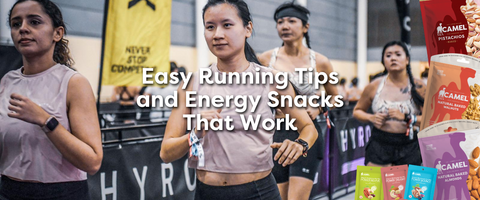As we mark Labour Day, it's worth reflecting not just on the contributions of workers, but also on how organisations can better support them. Support goes beyond recognition—it means creating healthier workplaces where they can thrive. Today’s professionals are navigating more complex work environments than ever, balancing hybrid schedules, tight deadlines, and increased digital fatigue.
This makes workplace wellness not a perk, but a necessity. For HR leaders, pantry managers, and company decision-makers, now is the time to build environments that truly enable people to thrive—physically, mentally, and emotionally. And often, it starts with better daily habits.
Rethinking Workplace Wellness: Practical Changes That Work
Creating healthier workplaces doesn’t always require expensive programs or sweeping policy changes. Instead, simple, thoughtful actions—from smarter snack options to flexible work norms—can go a long way in building a culture of well-being that benefits both employees and the business.
Burnout Is Rising—So Should Flexibility
Even with flexible arrangements, burnout is still prevalent. Employees often struggle to unplug or recover during the workday. The traditional workweek, packed with back-to-back meetings and unclear boundaries, leaves little room for mental clarity.
Little tweaks we can make:
Introduce simple, opt-in wellness initiatives—like wellness stipends, focus hours with no meetings, or extended lunch breaks once a week. These practices signal trust and flexibility, without mandating how people should rest. Giving employees breathing room can lead to better mental health, clearer thinking, and greater focus. For the organisation, this translates to lower turnover, higher engagement, and a more motivated team.
Physical Environments Shape Mental Performance
The design and upkeep of shared spaces—especially pantries and rest areas—can make or break a workday. Harsh lighting, clutter, or poor ventilation affect focus and comfort, yet often go unnoticed.
Little tweaks we can make:
Start with small adjustments: organise the pantry for ease, add calming elements like greenery, or upgrade communal areas with ergonomic seating. Make wellness feel like part of the office culture, not a separate initiative. Comfortable, inviting spaces foster productivity and belonging. Employees feel valued when their physical environment is supportive, and that emotional safety often leads to stronger collaboration and creativity.
Unhealthy Snacking Undermines Energy and Focus
Office snacks are meant to be convenient—but too often, they’re loaded with sugar, salt, and preservatives. These lead to energy crashes, sluggish afternoons, and long-term health risks.
Little tweaks we can make:
Gradually introduce smarter pantry choices—like fruits, low-sugar yogurt, and natural baked nuts—alongside traditional snacks. No need to eliminate everything at once; just offer better choices consistently. Nutritious snacks fuel sharper minds and sustained energy, benefiting everything from client calls to team brainstorms. A health-conscious pantry reflects an organisation that truly supports its people.
Wellness Isn’t Just a Company Initiative
Even if your company hasn't yet invested in a wellness pantry, you can still take charge of your daily habits. Keep a stash of smarter snacks at your desk, step out for mindful breaks, and choose nutrient-dense foods that support your mental clarity and stamina.
Making better choices isn’t about perfection—it’s about giving yourself the energy to perform and feel your best.
Snack Smart with Camel: Natural Picks for Sharper Minds
To support healthier snacking habits at work, Camel offers a selection of Natural Baked Nuts that align perfectly with modern wellness goals.
All products are free from added oil, preservatives, or artificial ingredients. Perfect for office pantries or personal work-from-home desks.
Conclusion: Small Habits, Big Difference
Whether you manage an office or manage yourself, building a healthier workday starts with intentional choices. From how we rest, to how we snack, to how we design our shared spaces—every habit counts.
And when wellness is embedded in the workplace, everyone wins.




